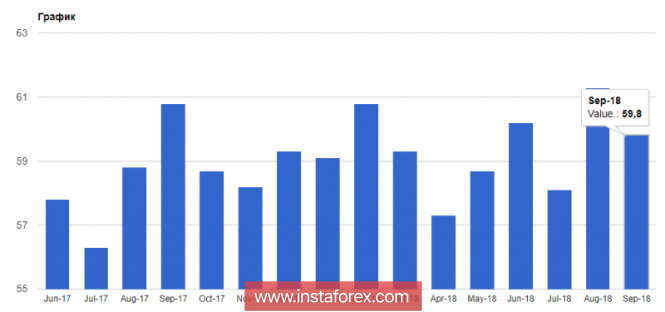Yesterday's weak data on the American economy failed to put pressure on the US dollar, which continued to strengthen against risky assets, especially against the European currency.
A report by IMF Managing Director Christine Lagarde led to the euro selling off in the afternoon, after the global economic outlook was revised downward.
Basic data
According to the data, construction spending in the United States in August increased compared with the previous month, but the increase was much worse than economists' forecasts.
As indicated in the report of the Ministry of Commerce, construction costs in the United States in August rose by 0.1% compared with July and amounted to $ 1.318 trillion. Economists had expected a monthly increase in spending by 0.5%. The volume of private construction in August fell by 0.5% compared with the previous month, while public spending on construction during the reporting period increased by 2% compared with the previous month.
Activity growth in the US manufacturing sector slowed down in September, as in many other developed economies.
According to the ISM Institute for Supply Management, the PMI Purchasing Managers Index for the US manufacturing sector in September of this year dropped to 59.8 points against 61.3 points in August, when it reached the 2004 maximum. Economists had forecast that the index would be 60.1 points. Let me remind you that the index values above 50 mean an increase in production activity.

IMF Forecast
As I noted above, yesterday's statements by the IMF Managing Director, Christine Lagarde, led to pressure on the euro. The decline began immediately after Lagarde voiced a pessimistic assessment of the world economy by the IMF, saying that the prospects for the world economy had deteriorated and the world economic climate was beginning to change for the worse. At the moment, according to the data, the outflow of funds from emerging markets could reach 100 billion US dollars.
Yesterday, US President Donald Trump officially announced a new trade agreement between the United States, Mexico, and Canada, stating that a trade agreement with Canada and Mexico is the most important one for all time. In his opinion, NAFTA's past agreement was the worst in history, and the new agreement is based on justice and interaction. The US president also noted that the agreement covers trade of nearly 1.2 trillion dollars.
Canadian Prime Minister Trudeau is also pleased with the signing, and he is confident that the agreement will remove uncertainty for producers and investors in both countries. Trudeau also said that he had to make compromises, but the concluded trade agreement would greatly benefit the economy.
Against this background, the Canadian dollar made another attempt to strengthen against the US dollar, which was unsuccessful.
The pound rose to talk about Brexit, but then lost all its positions
The British pound attempted growth, but did not receive support from major investors, after the British Brexit minister, Dominic Raab, yesterday urged his party to rally to support Prime Minister Theresa May's plan. Raab appealed to his negatively-minded colleagues with a request to consider, if not ideal, a plan promoted by the Prime Minister, which would enable him to achieve the long-awaited goal of withdrawing Britain from the EU.
Tomorrow, Theresa May will give an important speech on the topic of Brexit tomorrow.
Today, it is necessary to follow the speech of former Foreign Minister Boris Johnson, who will present his own concept of exit from the EU to party members.
The material has been provided by InstaForex Company - www.instaforex.com